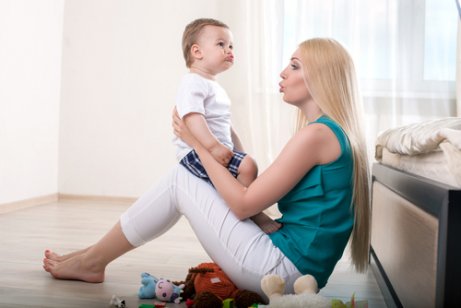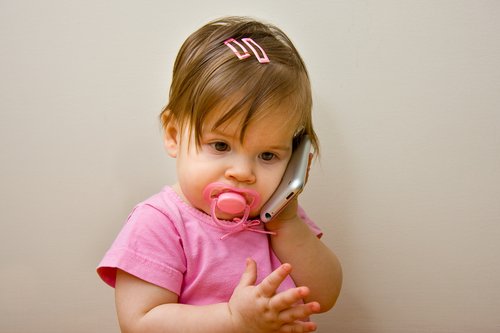Tips for Stimulating Babies So That They Start Talking

After months of hearing baby babble, it’s an emotional moment when your little one pronounces his or her first word. While this process is a natural part of development, there are ways in which you can stimulate babies to start talking. And that’s just what we want to talk about in today’s article.
Tips for stimulating babies so that they start talking
1. Start early
While it may seem useless to speak to newborn babies, it’s important to know that their ears and brains respond to sound at birth.
Therefore, the more words that babies hear, the more their speech will develop. Even though newborns don’t understand what you say during their first months, they’ll still enjoy your voice and smile.
This strategy is very beneficial for babies, so we recommend speaking to your little one as much as possible. Babies absorb much more than you probably imagine.
Parents play an important role in developing their children’s language. Learn how to speak to your baby the right way so he or she will start talking as soon as possible.
2. Share a book together
In second place, reading books with your baby is a stupendous idea. Of course, don’t expect your child to pay much attention to the plot. Nor does your child need to pay much attention to the story. Rather, this is about the enjoyable shared experience.

Spending time together is a key tool for inspiring children to have a greater vocabulary and become accustomed early on.
All of this helps contribute to early comprehension when it comes to speaking. Soon, your little one will start moving his or her mouth, wiggle around and gurgle as if to converse.
3. Babble with your baby
When your baby babbles and gurgles, join in as if you were responding. Repeat the sounds and rhythms your baby makes as a sort of imitation game.
Keep in mind that your baby will love capturing all of your attention, playing and imitating you. You can even introduce new sounds to the game to further capture your little one’s interests.
4. Respond to your child’s attempts
When your baby’s a bit older and can still only communicate using just one word, be sure to respond with complete sentences. If your little one uses only sounds, then you should respond using the correct syllables.
Even if your child is still unable to form complete sentences or use the right words, you’ll create a learning opportunity by responding correctly.
“Therefore, the more words a baby hears, the more his or her speech will develop. Even though newborns don’t understand what you say during their first months, they’ll still enjoy your voice and smile.”
5. Repeat words
Repeating your child’s words will also help in the development of language. If you pick up an object and repeat the name several times, your child will start to make vocabulary associations.
Little by little, your baby will start to connect the word with the object, and even come to pronounce the word. After all, babies learn through imitation. The more you repeat words in front of children, the more they will want to imitate and learn new words.
6. Relax and be patient
In general, children get a sense for their parents’ worries. This is an obstacle when it comes to creating the ideal climate for making large advances in development. Speaking requires courage. So, relax, be patient and trust in your child’s innate growth.

The experience of many parents is that the verbal abilities of their children emerge overnight. All of the sudden, their children have a sort of language explosion and start talking like never before.
However, if you suspect your child may be experiencing a delay in language comprehension or expression, you can always seek the advice of a specialist.
Finally, don’t forget that each baby develops differently and at a different rate. This means, of course, that each child starts talking at his or her own pace. During this early stage, it’s important to try to use the right words when you speak and sing with your child.
We’re sure that these suggestions and your desire to share everything with your child will speed up the learning process. Before you know it, you’ll hear your little one pronouncing his or her first words.
After months of hearing baby babble, it’s an emotional moment when your little one pronounces his or her first word. While this process is a natural part of development, there are ways in which you can stimulate babies to start talking. And that’s just what we want to talk about in today’s article.
Tips for stimulating babies so that they start talking
1. Start early
While it may seem useless to speak to newborn babies, it’s important to know that their ears and brains respond to sound at birth.
Therefore, the more words that babies hear, the more their speech will develop. Even though newborns don’t understand what you say during their first months, they’ll still enjoy your voice and smile.
This strategy is very beneficial for babies, so we recommend speaking to your little one as much as possible. Babies absorb much more than you probably imagine.
Parents play an important role in developing their children’s language. Learn how to speak to your baby the right way so he or she will start talking as soon as possible.
2. Share a book together
In second place, reading books with your baby is a stupendous idea. Of course, don’t expect your child to pay much attention to the plot. Nor does your child need to pay much attention to the story. Rather, this is about the enjoyable shared experience.

Spending time together is a key tool for inspiring children to have a greater vocabulary and become accustomed early on.
All of this helps contribute to early comprehension when it comes to speaking. Soon, your little one will start moving his or her mouth, wiggle around and gurgle as if to converse.
3. Babble with your baby
When your baby babbles and gurgles, join in as if you were responding. Repeat the sounds and rhythms your baby makes as a sort of imitation game.
Keep in mind that your baby will love capturing all of your attention, playing and imitating you. You can even introduce new sounds to the game to further capture your little one’s interests.
4. Respond to your child’s attempts
When your baby’s a bit older and can still only communicate using just one word, be sure to respond with complete sentences. If your little one uses only sounds, then you should respond using the correct syllables.
Even if your child is still unable to form complete sentences or use the right words, you’ll create a learning opportunity by responding correctly.
“Therefore, the more words a baby hears, the more his or her speech will develop. Even though newborns don’t understand what you say during their first months, they’ll still enjoy your voice and smile.”
5. Repeat words
Repeating your child’s words will also help in the development of language. If you pick up an object and repeat the name several times, your child will start to make vocabulary associations.
Little by little, your baby will start to connect the word with the object, and even come to pronounce the word. After all, babies learn through imitation. The more you repeat words in front of children, the more they will want to imitate and learn new words.
6. Relax and be patient
In general, children get a sense for their parents’ worries. This is an obstacle when it comes to creating the ideal climate for making large advances in development. Speaking requires courage. So, relax, be patient and trust in your child’s innate growth.

The experience of many parents is that the verbal abilities of their children emerge overnight. All of the sudden, their children have a sort of language explosion and start talking like never before.
However, if you suspect your child may be experiencing a delay in language comprehension or expression, you can always seek the advice of a specialist.
Finally, don’t forget that each baby develops differently and at a different rate. This means, of course, that each child starts talking at his or her own pace. During this early stage, it’s important to try to use the right words when you speak and sing with your child.
We’re sure that these suggestions and your desire to share everything with your child will speed up the learning process. Before you know it, you’ll hear your little one pronouncing his or her first words.
All cited sources were thoroughly reviewed by our team to ensure their quality, reliability, currency, and validity. The bibliography of this article was considered reliable and of academic or scientific accuracy.
- Cabrera, M.C. y Sánchez C. (1982). La estimulación precoz; un enfoque práctico. Editorial Siglo XXI: España.
- Dorance, S. y Matter, P. (2001). Juegos de estimulación para los más pequeños. Madrid: AKAL.
- Gallahue, D. (1982). Understanding motor development in children. New York: John Wiley and sons.
- Guerrero, A. M., & Primaria, I. Y. (n.d.). La estimulación temprana. https://archivos.csif.es/archivos/andalucia/ensenanza/revistas/csicsif/revista/pdf/Numero_14/AMALIA_MORENO_1.pdf
- Moreno, J. A. (1999). Motricidad infantil. Aprendizaje y desarrollo a través del juego. Murcia: Diego Marín.
- Moreno, J. A., & De Paula, L. (2006). Estimulación de los reflejos en el medio acuático. Revista Iberoamericana de Psicomotricidad y técnicas corporales, 6(2), 193-206. https://www.um.es/univefd/reflejos.pdf
- Ordoñez, M. y Tinajero, L. (2012). La importancia de la estimulación temprana en la etapa infantil. Madrid, 208-240.
This text is provided for informational purposes only and does not replace consultation with a professional. If in doubt, consult your specialist.








